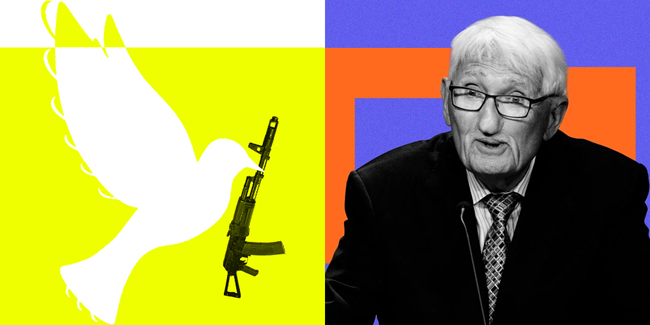
(ARTWORK: Sueddeutsche Zeitung)
Jürgen Habermas has recently written about the Ukraine war:
"A Plea for Negotiations" (Feb. 14, 2023)
https://www.sueddeutsche.de/projekte/ar ... ns-e480179
In a response article, published later the same day, Kurt Kister asks: "What Drives this Man?"
https://www.sueddeutsche.de/kultur/juer ... -1.5750864
As Kister reminds us, at nearly 94 years old, Jürgen Habermas is the world's most famous living German philosopher, who could easily be resting comfortably and quietly in his retirement near Lake Starnberg, but instead he continues not only to follow, but to engage with the pressing international issues of the day—such as Russia's war in Ukraine, which began one year ago today (on 24 Feb. 2023).
Habermas has pleaded for a balanced approach, Kister says; he does not speak out against supplying weapons to Ukraine, but instead points out that such supplies make the West share responsibility for perpetuating the war until a situation is reached that Ukraine perceives as "victory". However, Habermas also clearly warns that such a "victory" may never come—because Russia cannot be defeated militarily—which could put the West in a dilemma by drawing it in as an active participant in the war itself.
Habermas puts it this way: we could be faced with the hopeless choice of either "actively intervening in the war, or, in order not to trigger the First World War amongst nuclear-armed powers, leave Ukraine to its fate."
Kister points out that Habermas's thinking is not primarily analytical, if one understands by "analysis" the decomposition of things, contexts or sequences of concepts. Analysis dissects and explains the whole according to its individual parts and particular classification criteria established before disassembly.
Referencing Kister quotes Habermas (from an interview titled "Dialectics of Rationalization") as saying: "There are minds that are more analytical, and minds that are more synthetic, and I certainly belong more on the synthetic side." Referring to the Marxian dialectical formula of thesis—antithesis—synthesis, Kister says the thesis for Habermas is: "One side identifies with the Ukrainian government's demand for ever-increasing military support in order to defeat Russia." The antithesis is: "The other part wants to push the attempts to bring about a ceasefire and negotiations that at least avert a possible defeat... ", while the synthesis, Kister concludes, can perhaps be found in Habermas saying: "I am concerned with the precautionary character of timely negotiations."
If Ukraine cannot win this war, but, at the same time, "must not lose" it, then what does this non-loss look like?
Habermas acknowledges the West's (near) unanimity in supplying weapons to Ukraine, but not in terms of the goals this support is meant to achieve. Kister's conclusion is that Habermas' article is not just "a plea for negotiations" (between Russia & Ukraine), but also a plea for Ukraine's Western benefactors to negotiate the goals they are pursuing beyond the battlefield with their very active non-participation in the war.
Kurt Kister
Was treibt diesen Mann? ("What Drives this Man?") (Feb. 14, 2023)
https://www.sueddeutsche.de/kultur/juer ... -1.5750864
Jürgen Habermas
"A Plea for Negotiations" (14 Feb. 2023)
https://www.sueddeutsche.de/projekte/ar ... ns-e480179
Jürgen Habermas
"War and Indignation" (28 Apr. 2022)
https://www.sueddeutsche.de/projekte/ar ... ne-e032431
